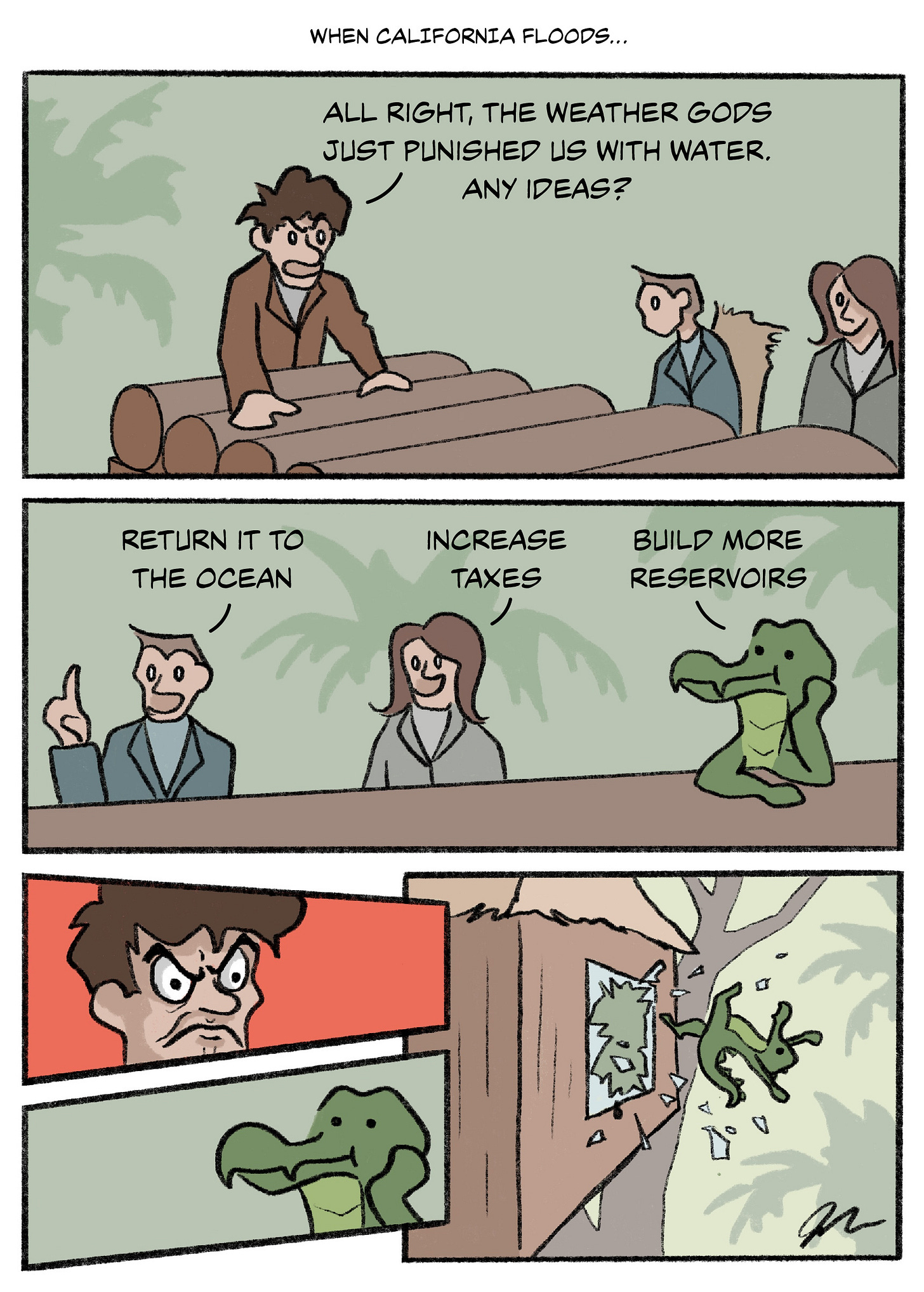
Thanks for joining us.
This time of month, we’re glad you’re here. We hope this hodgepodge is a break from all the scroll-worthy, tinfoil hat internet fodder… if you ask us, there’s been way too of that lately.
Read on for Joey Nance’s first croc cartoon, thoughts on California’s newfound water surplus, and what we wish our English teachers had really taught us,. In his column on authors to read, D.T. Adams goes into detail on ‘That Hideous Strength,’ and how Lewis saw today’s madness coming.
As always, you’re the judge, the one who decides whether or not this is a worthwhile tradeoff. But with ChatGPT (or should we say Skynet) breathing down our trembling, writer’s necks… we hope you’ll keep scrolling here.
Rain and Drought
Out West, January rained and poured.
By some estimates, regions of California bubbled up with seventeen to twenty inches of rainfall over a ten day period. Good news for the drought, right?
For a hot minute maybe. But California is a hot, dry state that (aside from the last two years) has been growing for decades… without completing stage II of the ambitious water project launched in 1960 to support said growth. Don’t surprised when the drought’s on again, and when it is, this one’s on us.
Unfortunately, no delta smelt—the local, endangered, San Francisco Bay species that’s been the subject of a rainwater dumping rescue mission for decades—are available for comment.
Credit due?
To his coiffed, White House drooling credit, Gavin Newsome bemoaned the fact that California’s red tape and regulation make it all but impossible to expand reservoir storage. Earlier, and in his first term as governor, he took (or tried to take) California cities to task for their strict zoning laws, the likes of which have throttled housebuilding for decades.
What can we say?
When he’s not strolling through redwoods, jousting with Florida, Texas, or Missouri, or pitching California as a great place for businesses that support gender-affirming body mutilation and unfettered abortion access, the Gav Man sometimes gives of a flicker of problem-solving responsibility.
A flicker, mind you—which is more than our Transportation Secretary has given about a fifty car train derailment, chemical spill, and controlled burn that has animals dying, and residents of a small, Ohio town terrified.
Oregon whale explosion, anyone?
“If books are among our friends, we ought to apply similar standards to them that we apply to our flesh-and-blood friends. We should want to choose them wisely and well and hope that we will be better for their companionship.”
-Douglas Wilson, Writers to Read
Oh, English Class…

This time around, we’re regretting how hard we laughed when Nick Miller chucked his 10th grade, library-issued copy of ‘Pride and Prejudice’ on the school roof.
Our apologies, Miss Austen.
We hope we’ve made up for it with Noelle McEachran’s fine piece on ‘Emma,’ and why Austin is worth reading.
With that pimply confession out of the way, we’re not saying that our public school English teachers had everything right. Here’s a shortlist of what we wish they’d taught us about loving books and starting habits of lifelong reading.
Some of these are tongue in cheek, but we’ve padded them up with good, sincere stuff that you’ll recognize.
If you didn’t flunk English, that is.
What our English Teachers Should Have Told Us:
Loving books means you should read them. Otherwise, it’s like saying you love someone but never spend any time with them. Who does that?
Read what you love - when choosing what to read, follow your interests. You’ll remember the book better if you start out interested in its topic or story.
Once in a while read what you hate - a proverbial contradiction, I know. But if you never read anything that feels like bench pressing a little more than you’re comfortable with, you’ll forget how to become a stronger reader. Don’t forget, you can always start a book club with a friend to be your spotter.
Write in your books* - Don’t stone us, please. In that same way that interjecting, or asking a question when someone talks to you makes a monologue into a conversation, writing down questions, reactions or even snarky comments goes well with thoughtful, full-brain reading—and it tilts the experience into something of a conversation.
*Speaking of writing in books, J.J. Abrams and Doug Dorst’s ‘The Ship of Theseus’ is a novel written of notes between two people… scribbled in the margins of a novel. Reading their back and forth takes you into the mystery of the book’s shadowy author, V.M. Straka. If you read far enough, it includes a something akin to a compass and a treasure map.
If you want a job as a writer, learn to write for search engines. So, while we work on writing quality essays, remember that what matters is what Google thinks, not the quality of your writing.
By the time you graduate, writing will be obsolete—while we focus on the intricacies of English grammar, remember that you won’t need any of this as an adult. ChatGPT will be doing all of the writing by then.
Reading the classics will only frustrate you - Rather than torture yourself by becoming familiar with the literature on which Western society was founded and subsequently becoming aware of how far we’ve fallen, it might be better to stay in blissful ignorance. Your best bet is sticking with Twilight, the Divergent series, of a like a good scare, R.L. Stine’s ‘Goosebumps.’
If you work up the guts to read a classic, treat to yourself to memory lane with the occasional ‘Goosebumps’ once in a while. From one reader to another, there’s nothing wrong with that.
A Sycophant, a Feminist… and Merlin
D.T. Adams on ‘That Hideous Strength’
Previously, I discussed the first two novels in C.S. Lewis’s Ransom Trilogy: Out of the Silent Planet and Perelandra. Both follow the Christian philologist and unwitting interplanetary traveler Ransom to Mars, Venus, and then back to Earth for the third and final act.
The third novel That Hideous Strength, brings everything into focus, dialing in the distinctly Christian theme of good and evil rolling back up their sleeves for one last arm wrestle. When the forces of materialistic, power-seeking scientific coalition themselves with the demonic, an unlikely band of ordinary, college town residents led by Ransom shoulders Earth’s resistance.
In the midst, or rather, at the very center of all this, Lewis focuses in on two new characters: Mark and Jane, a young married couple.
Mark is a faculty member at Bracton College, a bland careerist whose one goal in life is to be a part of the in-group. Early on he’s rushed off to Belbury to become a member of the ultimate, and increasingly powerful in-group, the National Institute of Coordinated Experiments (or N.I.C.E.).
The people there play on his, and everyone’s desire to be in for one nefarious ends—shaping humanity, and all organic matter into their sterile image and using science to transcend bodily limitations. In the words of Feverstone, a N.I.C.E. member, “If Science is really given a free hand it can now take over the human race and re-condition it… man has got to take charge of man. That means, remember, that some men have got to take charge of the rest.”
Their goals of controlling, sterilizing, and even re-animating matter in the form of a severed, talking head are their Babel; they will rule humanity, using technology to secure their position as immortal beings.
Humanity rejecting its God-given boundaries is a primary theme throughout this book. Lewis foresaw the transhumanism, gender madness, and mad-scientist aspirations of our own time. In what feels like a sci-fi fever dream by the near end, he caricatures these scientists and their naked desire for world domination through a bizarrely prescient trans-humanism.
While Mark goes to Belbury, Jane visits St. Anne’s, a household in the country, at the recommendation of Mrs. Dimble (the wife of another Bracton professor). Jane, a devoted feminist, is drawn into the company at St. Anne’s and she eventually joins the resistance against the N.I.C.E.
How is this postwar Babel destroyed and its builders thrown into confusion?
With the help of the gods.
The Oyarsa, Lewis’s planetary demigods, descend to earth and, through a series of incredible events and the help of Merlin (yes, the Arthurian wizard), throw the plans of the N.I.C.E. into absolute confusion. What what some argue as an odd, fantasy-leaning plot twist, Lewis hits a home-run nonetheless. Merlin’s intervention crashes the N.I.C.E’s plans in a deservingly violent fashion, and helps put everything right in God’s order.
Marriage at the Center
The ultimate resolution, though, concerns Mark and Jane. Early on, they’re cold to each other, distant, and given over to modern pathologies that prevent them from building a true life together through marriage. Jane, who is eager to push back against the notion of submission to her husband, is eager to get on with her own advancement. Mark, likewise has time for nothing else by scrambling up the greasy pole of academia—the one that soon takes him right to the chambers of the N.I.C.E.
Later on, after Jane discovers that the terrifying dreams she has are a kind of psychic window to the inner workings of the N.I.C.E., she’s captured and even tortured; Mark is nowhere in sight.
Through the twists and turns of the novel, Jane, and later on, Mark both join the resistance, and when they reunite at the end, their invitation to a refurbished, honeymoon-like bedroom is no small detail. Jane has learned that to submit to God, she must submit to her husband. Mark, alternatively, has learned to rebel against the in-group, resisting evil and fighting back with a God-given Martian spirit. By the end, they’ve both submitted to their God-given roles.
That’s the point made again and again in this trilogy: there is a God-given hierarchy. Our job is to learn our place in it and occupy it well, with submission to God as the foundational step. As we mature, we become aligned with how God created the world and can better love God and our fellow man.
*If you enjoyed this short series on each book in the Ransom Trilogy, you might also enjoy our interview with author Christiana Hale, and her book ‘Deeper Heaven: A Reader’s Guide to the Ransom Trilogy,’ published by Roman Roads Press.


Coming Up
With quotes aplenty, C.M. Miller posits that history lovers—and for that matter, everyone else—should read the ambitious, meandering works of Paul Johnson.
He was prolific to the very end, and for good reason.








Fantastic edition of Crocodiles! I'm now curious to read the Ransom Trilogy. Lewis certainly had his finger on the pulse of something wicked coming our way. He even touches on these modern ills in the addendum to The Screwtape Letters, titled "Screwtape Proposes A Toast". I quote, "For
'democracy' or the 'democratic spirit' (diabolical sense) leads to a nation without great men, a nation mainly of subliterates. morally flaccid from lack of discipline in youth, full of the cocksure-ness which flattery breeds on ignorance, blustering or whimpering if rebuked. And that is what Hell wishes every democratic people to be."
Also, a big +1 for Paul Johnson & A History of the American People!